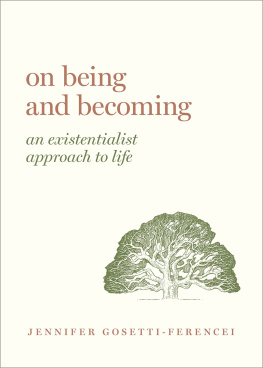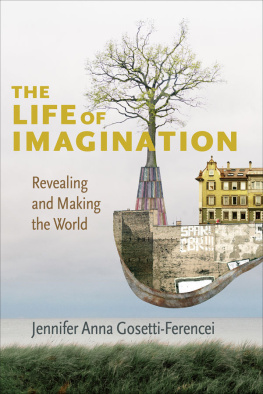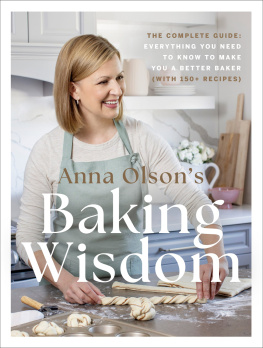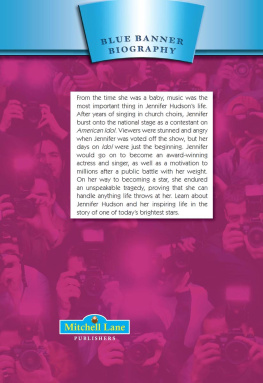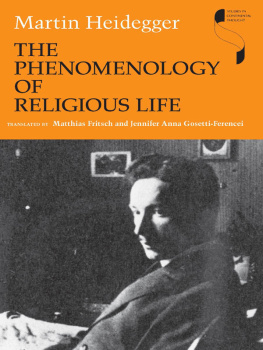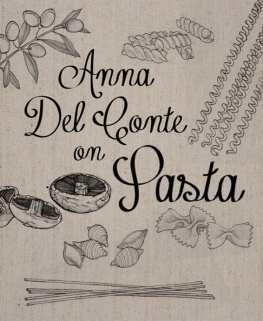Jennifer Anna Gosetti-Ferencei - On Being and Becoming
Here you can read online Jennifer Anna Gosetti-Ferencei - On Being and Becoming full text of the book (entire story) in english for free. Download pdf and epub, get meaning, cover and reviews about this ebook. year: 2020, publisher: Oxford University Press, genre: Religion. Description of the work, (preface) as well as reviews are available. Best literature library LitArk.com created for fans of good reading and offers a wide selection of genres:
Romance novel
Science fiction
Adventure
Detective
Science
History
Home and family
Prose
Art
Politics
Computer
Non-fiction
Religion
Business
Children
Humor
Choose a favorite category and find really read worthwhile books. Enjoy immersion in the world of imagination, feel the emotions of the characters or learn something new for yourself, make an fascinating discovery.
- Book:On Being and Becoming
- Author:
- Publisher:Oxford University Press
- Genre:
- Year:2020
- Rating:3 / 5
- Favourites:Add to favourites
- Your mark:
- 60
- 1
- 2
- 3
- 4
- 5
On Being and Becoming: summary, description and annotation
We offer to read an annotation, description, summary or preface (depends on what the author of the book "On Being and Becoming" wrote himself). If you haven't found the necessary information about the book — write in the comments, we will try to find it.
On Being and Becoming — read online for free the complete book (whole text) full work
Below is the text of the book, divided by pages. System saving the place of the last page read, allows you to conveniently read the book "On Being and Becoming" online for free, without having to search again every time where you left off. Put a bookmark, and you can go to the page where you finished reading at any time.
Font size:
Interval:
Bookmark:

GUIDES TO THE GOOD LIFE
Stephen Grimm, series editor
Seeing Clearly: A Buddhist Guide to Life
Nicolas Bommarito
On Being and Becoming: An Existentialist Approach to Life
Jennifer Anna Gosetti-Ferencei

Oxford University Press is a department of the University of Oxford. It furthers the Universitys objective of excellence in research, scholarship, and education by publishing worldwide. Oxford is a registered trade mark of Oxford University Press in the UK and certain other countries.
Published in the United States of America by Oxford University Press
198 Madison Avenue, New York, NY 10016, United States of America.
Oxford University Press 2021
All rights reserved. No part of this publication may be reproduced, stored in a retrieval system, or transmitted, in any form or by any means, without the prior permission in writing of Oxford University Press, or as expressly permitted by law, by license, or under terms agreed with the appropriate reproduction rights organization. Inquiries concerning reproduction outside the scope of the above should be sent to the Rights Department, Oxford University Press, at the address above.
You must not circulate this work in any other form and you must impose this same condition on any acquirer.
Library of Congress Cataloging-in-Publication Data
Names: Gosetti-Ferencei, Jennifer Anna, author.
Title: On being and becoming : an existentialist approach to life /
Jennifer Anna Gosetti-Ferencei.
Description: New York, NY, United States of America : Oxford University Press, 2021. |
Series: Guides to the good life | Includes bibliographical references and index.
Identifiers: LCCN 2020001345 (print) | LCCN 2020001346 (ebook) |
ISBN 9780190913656 (hardback) | ISBN 9780190913670 (epub) | ISBN 9780197516867
Subjects: LCSH: Existentialism. | Life. | Ontology.
Classification: LCC B819 .G654 2020 (print) | LCC B819 (ebook) |
DDC 142/.78dc23
LC record available at https://lccn.loc.gov/2020001345
LC ebook record available at https://lccn.loc.gov/2020001346
For Arthur and Alden
Several ancient philosophers held that the point of studying ethics was not just to learn about ethicsas one might learn about chemistry, astronomy, or historybut to become a better human being. They also recognized that this was not easy to do. In order for thinking about ethics to make a difference in our lives, they argued that our habits and inclinations needed to be educated right alongside our minds. They therefore claimed that what mattered to living well was not just what we thought but how we thought, and not just how we thought but how we emotionally responded to the world and to other people.
The books in this series highlight some of the transformative ideas that philosophers have had about these topicsabout the good life, and the practices and ways of life that help us to pursue it. They tell us what various philosophers and traditions have taken to be most important in life, and what they have taken to be less important. They offer philosophical guidance about how to approach broad questions, such as how to structure our days, how to train our attention, and how to die with dignity. They also offer guidance about how to deal with the sort of everyday questions that are often neglected by scholars, but that make up the texture of our lives, such as how to deal with relationships gone wrong, family disruptions, unexpected success, persistent anxiety, and an environment at risk.
Because the books are written by philosophers, they draw attention to the reasons and arguments that underlie these various claimsthe particular visions of the world and of human nature that are at the root of these stances. The claims made in these books can therefore be contested, argued with, and found to be more or less plausible. While some answers will clearly compete with one another, other views will likely appear complementary. Thus a Confucian might well find that a particular practice or insight of, say, Nietzsches helps to shed light on his or her way of living in the world, and vice versa. On the whole, the idea is that these great philosophers and traditions all have something to teach us about how to be more fully human, and more fully happy.
Above all, the series is dedicated to the idea that philosophy can be more than just an academic disciplinethat it can be, as it was for hundreds of years in the ancient world, a way of life. The hope is also that philosophy can enhance the ways of life we already feel pulled toward, and help us to engage with them more authentically and fully.
Stephen R. Grimm
Professor of Philosophy
Fordham University
September 2019
I am not able to name here all of the many friends and colleagues who have, over the years, illuminated for me aspects of the human condition discussed in this book. I am indebted to many. I can here only thank in particular those who, during the time of the preparation and writing of this book, offered invaluable support, friendship, or inspiration: Steve Magill, Alexandra Delp, Melissa Kearns, Kim White, Mary Jo Salter, Alex von Thun, Susan von Thun, my sister Victoria, my sister Angela, and my mother, Marietta. This book is dedicated with love to my sons, Arthur and Alden, to their being and becoming.
The fact that you have picked up a book like this one and have begun to read it suggests that you strive for a fulfilling life. Presumably you aim, like many people do, to live as well and as meaningfully as possible, well aware that you have only one life, and that it is finite. Each day you press forward with no clear path signposted just for you. Your existence comes with no set of instructions for how exactly to go about it. You will be well aware, perhaps with some anxiety, that only you can make some crucial decisions which will shape your existence, determine how your one life will play out. Existential philosophy begins by thinking from the standpoint of an individual concretely existing, wondering how to make sense of this existence.
This may be anything but straightforward. In a busy, overcrowded world, there will be distractions everywhere from any goal you might try to keep in mind. At times you may not know which goals to strive for. Difficulties will arise. Some demands upon you will conflict with others, and responsibilities may come to feel relentless. Perhaps they do right now. You may come to wonder what this life is all about, and sometimes even despair at the lack of an answer. A sudden loss or change can render exigent otherwise merely nagging uncertainties. All of these concerns are the stuff of existential philosophy.
If philosophy can be applied to spiritual ailments, existentialism is one of the most versatile prescriptions. Most people at some point in their lives will experience moments of suffering that have an existential cast. This is suffering that impacts your sense of self, making you wonder who you really are or ought to be, making you wonder about the purpose of your existence. The works of existentialist philosophers elaborate on such phenomena as despair, anxiety, dread, angst, forlornness, the tragic, the absurd, nothingness, being-toward-death, ennui, oppression, and inauthenticity.
While not solving such human difficulties, existentialism recognizes and studies them in philosophical terms. Indeed, when a crisis is diagnosed as existential, it is salvaged from the indignity of mere pain and recognized as bearing what the Danish philosopher Sren Kierkegaard called a subjective truth. The remedy of existential thinking comes in the form of relating individual struggles to a human condition understood as universal, and of illuminating the freedom and responsibility, or the creativity, with which they can be tackled.
Font size:
Interval:
Bookmark:
Similar books «On Being and Becoming»
Look at similar books to On Being and Becoming. We have selected literature similar in name and meaning in the hope of providing readers with more options to find new, interesting, not yet read works.
Discussion, reviews of the book On Being and Becoming and just readers' own opinions. Leave your comments, write what you think about the work, its meaning or the main characters. Specify what exactly you liked and what you didn't like, and why you think so.

